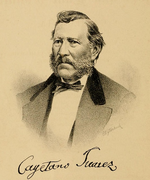Copia: The American Center for Wine, Food & the Arts was a non-profit museum and educational center in downtown Napa, California, dedicated to wine, food and the arts of American culture. The center, planned and largely funded by vintners Robert and Margrit Mondavi, was open from 2001 to 2008. The 78,632-square-foot (7,305.2 m2) museum had galleries, two theaters, classrooms, a demonstration kitchen, a restaurant, a rare book library, and a 3.5-acre (1.4 ha) vegetable and herb garden; there it hosted wine and food tasting programs, exhibitions, films, and concerts. The main and permanent exhibition of the museum, "Forks in the Road", explained the origins of cooking through to modern advances. The museum's establishment benefited the city of Napa and the development and gentrification of its downtown.
Copia hosted its opening celebration on November 18, 2001. Among other notable people, Julia Child helped fund the venture, which established a restaurant named Julia's Kitchen. Copia struggled to achieve its anticipated admissions, and had difficulty in repaying its debts. Proceeds from ticket sales, membership and donations attempted to support Copia's payoff of debt, educational programs and exhibitions, but eventually were not sufficient. After numerous changes to the museum to increase revenue, Copia closed on November 21, 2008. Its library was donated to Napa Valley College and its Julia Child cookware was sent to the National Museum of American History. The 12-acre (4.9 ha) property had been for sale since its closure; the Culinary Institute of America purchased the northern portion of the property in October 2015. The college opened its campus, the Culinary Institute of America at Copia, which houses the CIA's new Food Business School.




